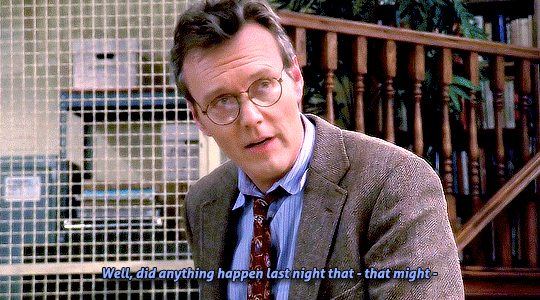Text
Spoiler-Free Advance Review:
Exordia by Seth Dickinson
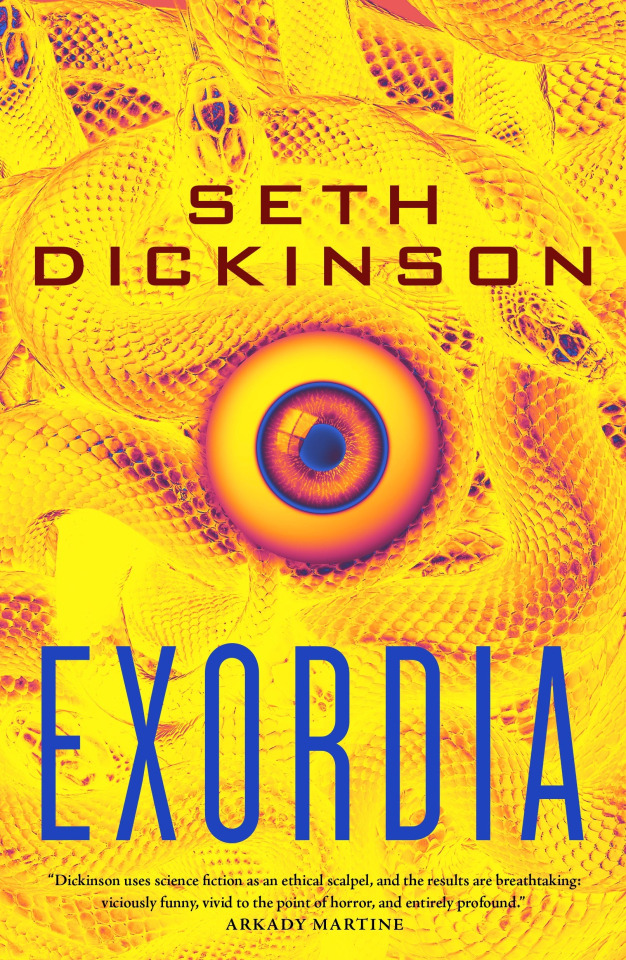
I could not put this book down, my god. Staying up super late multiple nights because I couldn’t stop reading is such a great problem to have, and Exordia gave me that problem more than any book I’ve read in a few years.
This is a very different book than Baru, but Seth’s evocative prose and dark humor is familiar from page one, and the laser focus on defamiliarizing real world injustices is again the core of the work. Despite being far more immediate (Exordia is set during the Obama administration in our world, with an alternate history beginning from the moment the book starts), the heaviness of the topics never gets overwhelming. There’s some incredible (and extremely fitting) tonal dissonance here, with every perspective character having their own sense of disaffected humor about the apocalyptic situation they’ve been thrown into.
I described this to my friend after just starting as “if the Books of Sorrow were written with Gideon the Ninth’s tone and just straight up in our world,” and I think that remains true throughout. There’s a huge amount of references peppered in, and it helps maintain that lighter tone to balance the despair of what is essentially a doomsday clock ticking down throughout the book - and it helps keep things grounded, honestly. I never felt it took away from the gravity of things, or was unnatural - after all, if I, an early 21st century sci fi nerd, was thrown into some fucked up alien bioweapon mystery, it’s hard to say my first thought wouldn’t be “oh shit, this is just like the Andromeda Strain!”
Having seven (eight?) different protagonist (or deuteragonist, I don’t know which they qualify as) PoVs is pretty wild but works perfectly here. Every character has such a unique outlook that you can instantly figure out whose head you’ve popped into even before any identifying names or things are mentioned - Seth’s mastery of the tonally cohesive PoV shifts was something I had loved in Tyrant, especially, and they’re equally impressive here. The characters are lovable, hatable, and everything in between - and each as mentioned is so distinct and compelling that I can’t say there was a single character who I was unhappy to get into their head. And that’s saying something, given who some of these characters are, but I’ll leave the specifics a surprise. Predictably, my favorites were the dysfunctional autistic butch-femme lesbians, but I really loved all of them in the end.
The base premise is almost comical in how small it starts to how much it escalates - a cynical, disillusioned Kurdish genocide survivor, Anna Sinjari, meets a terrifying (and yes…very hot. I’m a simple woman) alien in Central Park, and this seemingly chance encounter sees her roped into a small group of scientists, soldiers, and her own mother in a desperate countdown to solve an otherworldly mystery and save their world. The twists and turns of the plot are intense, so engaging that I was bouncing up and down at times (there’s plenty of sci-fi insanity that I absolutely eat up), and tightly paced.
Seth seems to really enjoy writing ethical dilemmas to great effect, and Exordia is ruthless in that area, taking the base concept of the trolley problem and the moral justification for what someone would sacrifice for the greater good and carving it apart for narrative weight. What greater good does the sacrifice serve? Is it actually good? Who gets to make the choice, and do they have a choice but to make it? There’s a lot to dig into here, and Exordia is a four course meal.
One aspect of this simply taking place in our world, rather than being an alternate universe like Baru, is that the defamiliarized commentary is even more on the nose. Whereas Baru is a commentary on empire and homophobia as a whole, transparently pulling from primarily American history of genocide and imperialism to shape a culture unlike our own in many ways to defamiliarize this moral exploration, Exordia is just literally about real world American imperialism and enabling of genocide in the MENA region, primarily the ramifications of the military industrial complex’s usage of drone warfare and the extremist regimes armed and encouraged by “counterterrorism.”
All this sets the stage for the question of what happens when a bigger fish arrives, one just as hell bent on empire building and justifying its own atrocities. The sci-fi intervention into this banal evil is at the same time a reflection of that evil, and asking if the world has the capacity for resistance to both. Exordia’s answer is profound, and far from easy, but entirely fitting for the ethical dilemma that runs throughout the book, creeping up on you slowly as you start to recognize what shape it takes in this story.
The central material conflict of the book, a locked box mystery of sorts that you piece together with the characters, is fucked up and fun and scary, a reality shifting threat that treads the line between body horror, meta-narrative, and lovecraftian math. It’s extremely cool, and I think it’ll be right up the alley of fans of The Andromeda Strain, The Locked Tomb, The Books of Sorrow and other parts of Destiny lore, and a lot of other SFF stories where ethics, horror, and mystery mix together.
I don’t want to say too much about the climax and the ending - going into this book without knowing too much was an incredible experience that had me on the edge of my proverbial seat - but the ending left me asking myself some very similar questions as I had at the end of Traitor, and I cannot wait for a reread when the physical book is in my hands to see what little foreshadowed things I can pick up on.
I don’t think people are going to be quite as completely emotionally Destroyed at the ending of this one as Traitor, but…it is very much a Seth Dickinson book, and they have quite the talent for making every thread tie together at the end to make the reader feel every emotion at once and realize that this could never have gone any other way. I cried, I laughed, sometimes simultaneously, and a book that can do that to me is entirely worth the experience - and what an experience this was.
Absolutely fucking incredible, I want more of these characters and everything they’re wrapped up in, 10/10.
I received an ARC of this novel from NetGalley in exchange for an honest review.
76 notes
·
View notes
Text
Exordia - advance review
So. I finished the book!
This is not everything I will write about Exordia. That will come when the book is like, officially out, and I feel comfy spelling out the ending and quoting passages at length.
This 'advance review' is split into two parts. The first part is quite abstract, so I'll copy it here.
If Baru took an elliptical path towards its subject matter, by defamiliarising and rearranging the material of history… Exordia just gets straight in there.
How to describe Exordia? Maybe you could call it philosophy-driven science fiction, a thought experiment about ethics. Maybe you could compare it to Arrival, but shot up with black humour (it’s a book that could make me laugh and cry, sometimes at the same time) and real tragedy (at the core is the genocide of the Kurds in the late 80s, and the many betrayals and failures of American imperialism). It’s got a lot of action and military details, with a good few spies and soldiers as central characters, but broadly it’s one of the sharpest eviscerations of the US military and its role in the world I’ve encountered in Western science fiction.
The first two thirds or so lay out the driving, fascinating ‘what the hell is this thing’ mystery lined with all manner of juicy body horror and drama—yet the core high-concept premise is laid out almost immediately, you know what's at stake. The last third… escalates.
It’s full of the usual meaty Seth themes, iterating on the ideas first laid out in Baru. But it’s a distinct flavour of its own. That escalation is… well, I can’t describe in detail, not while the book isn’t even out, but it’s nuts. Not just for the scale, but for how convincingly it sells concepts that if I described them straightforwardly would sound completely ridiculous.
Equally, it’s a study of a markedly diverse group of characters thrown together from all over the world, each constructed with very evident care and nuance. It goes places that so many writers would probably feel ‘damn, that’s probably way too thorny for someone like me to write about’—and yet somehow, it manages to handle it gracefully each time. Certainly, you can perhaps inevitably tell when Seth is writing from direct experience and when they are (as they used to say back in the ’10s) Writing The Other, if only through what they assume you know and what they need to explain as much as everything—and yet there are always all these telling details (the scientist cursing out R) that make these characters come alive with convincing presence and humour.
(Of course the autistic-ass lesbians are my faves. It’s not as overtly a Lesbian Book as Baru was, but there’s a strong current of gay shit.)
A few other reviewers mention Crichton, but I haven’t read Crichton, so… I’ll have to make other comparisons. But then the thing is it’s very self-aware about existing in the fabric of science fiction. This book is set in our world, not in the near future but the recent past, in the late Obama administration. A lot of the things you might compare it to (including a couple I’ve mentioned, Arrival, Crichton) will be invoked as explicit, in-character allusions as these very sharp, funny, modern people try to make sense of their crazy situation. Sometimes it feels like Tamsyn’s use of memes as texture, but it never gets overbearing. The rhythms of Seth’s prose have been refined by Baru into a powerful suite of devices to make you cackle and go, noooo, Seetttthhhhh…
It’s a fascinating blend of hard-ish scifi, with the big ideas carried by surprisingly accurate higher-mathematical technobabble, and what you could probably best call occultism: narrative and ethics and gods and mythology. Seth always tends to deflect when praised for their ability to hop between a dozen different disciplines and pull them together into one unifying story, saying that they’re just good at looking up summaries, or that they had help from the right people. Maybe so, but it works, it passes the smell test, and Seth’s real genius is their remarkable ability to tie all these big grand ideas back into the world of character and emotion.
Since this is an advance review… I gotta be careful how much I say! Usually I assume you’ve read it if you’re going to and dive straight into the spoilers and long quotes, but here I feel like I should take a little care to avoid describing too precisely the exact beats of the story. (Rest assured I will give it the thorough treatment when it comes out in full).
But, I feel like I want to say something a little more substantial. So here’s a description of the mechanism. If all you want to know is whether you should read this book, hopefully I’ve given you plenty of reasons that the answer is god, yes, do it. If you want to know more, read on.
149 notes
·
View notes
Text
2024 Book Review #6 – Exordia by Seth Dickinson
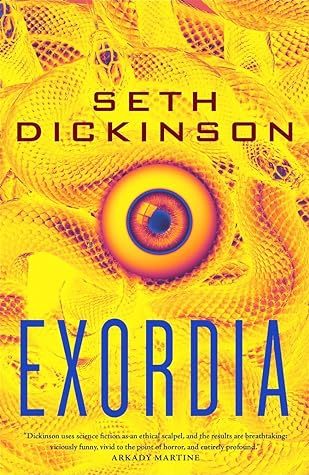
This is a book I have been looking forward to for quite literally years, from someone who is easily one of my favourite working authors. I also read the short story the book was expanded out from before I even knew it was going to be a book, and so went in spoiled on the broad strokes of what turned out to be the climax of the whole thing. All to say my opinion on this is unlikely to match that of the typical reader, I guess.
Anyway, Exordia is a glorious spectacular mess that has no right to cohere anywhere near as well as it does. It’s target audience is small, but I’m certainly somewhere in it. Please ignore all the marketing it’s so bad you have to wonder if someone at Tor just has it out for the author.
Exordia is a, well, a profoundly difficult book to give any sort of plot summary for. The first act involves Anna, a 30-something survivor of the Anfal Genocide now living a rather unimpressive life in New York City, until one day in the early 2010s she sees an alien eating the turtles in Central Park. Then there’s a cat-and-mouse hunt between terrifying alien snake-centaurs for the future of free will in the galaxy, and the plot jumping to kurdistan, and six more POV characters from as many different nations, and nuclear weapons, and oh so many people dying messily. The first act is an oddly domestic and endearing piece of table setting, the second is (to borrow the idiom of the book’s own marketing) Tom Clancy meets Jeff Vandermeer or Roadside Picnic, and the third is basically impossible to describe without a multipage synopsis, but mostly concerned with ethical dilemmas and moral injuries. It’s to the book’s credit that it never bats an eye at shifting focus and scale, but it does make coming to grips with it difficult.
This is, as they say, a thematically dense book, but it’s especially interested in the fallout of imperialism. The Obama-era ‘don’t do stupid shit’ precise and sterile form of it in particular – the book’s a period piece for a reason, after all. The ethics of complicity – of being offered the choice of murdering and betraying those around you or having an alien power with vastly superior destructive powers inflict an order of magnitude more misery to you, them, and everyone in the same general vicinity to punish you for the inconvenience – is one that gets a lot of wordcount. It is not an accident that the man most willing and able to collaborate with the overwhelming powerful alien empire in hopes of bargaining some future for humanity is the National Security Council ghoul who came out of organizing surveillance information for the drone wars. It’s also not a coincidence that the main (if only by a hair) protagonist is someone with a lot of bitter memories over how the US encouraged Iraq’s kurdish population to rebel in the ‘90s and then just washed their hands and let them be massacred (the book couldn’t actually ship with a historical primer on modern kurdish history, so it’s woven into the story in chunks with varying amount of grace. But it is in fact pretty thematically key here).
Speaking of complicity, the book’s other overriding preoccupation in (in the broadest sense) Trolley Problems. Is it better to directly kill a small number of people or, through your inaction, allow a larger number to die? Does it matter is the small number is your countrymen and the larger foreigners, or vice versa? What about humans and aliens? Does it matter whether the choice is submitting to subjugation or killing innocents as a means to resist it? What about letting people around you die to learn the fundamental truth of the cosmos? Does the calculus change when you learn that immortal souls (and hell) are real? This is the bone the story is really built around chewing on.
All that probably makes the text seem incredibly didactic, or at least like a philosophical dialogue disguised as a novel. Which really isn’t the case! The book definitely has opinions, but none of the characters are clear author-avatars, and all perspectives are given enough time and weight to come across as seriously considered and not just as cardboard cutouts to jeer at. Okay, with the exception of one of the two aliens who you get the very strong sense is hamming it up as a cartoon villain just for the of it (he spends much of the book speaking entirely in all caps). There definitely are a couple points where it feels like the books turning and lecturing directly at the reader, but they’re both few and fairly short.
The characters themselves are interesting. They’re all very flawed, but more than that they’re all very...embodied, I guess? Distracted with how hot someone is, concerned with what they ate that morning or the smell of something disgusting, still not over an ex from years ago. Several of them are also sincerely religious in a way that’s very true to life to actual people but you rarely see in books. The result is that basically comes as being far more like actual humans than I’m at all used to in most fiction (of course, a lot of those very human qualities get annoying or eye-roll inducing fairly quickly. But hey, that’s life). Though that’s all mostly the case at the start of the book – the fact that the main cast are slowly turning into caricatures of themselves as they’re exposed to the alien soul manipulation technology is actually a major plot point, which I’m like fifty/fifty on being commentary on what happens to the image and legacy of people as they’re caught up in grand narratives versus just being extended setup for a joke about male leads in technothrillers being fanfic shipbait.
Part of the characters seeming very human is that some (though by no means all) of the POVs are just incredibly funny, in that objectively fucked up and tasteless way that people get when coping with overwhelming shock or trauma. It’s specifically because the jokes are so in-your-face awful that they fit, I think? It manages to avoid the usual bathetic trap a lot of works mixing in humour with drama fall into, anyway.
Speaking of alien soul manipulation technology – okay, you know how above I said that the points where the book directly lectured the reader were few and far between. This is true for lectures about politics or morality. All the freed up space in this 530 page tome is instead used for technobabble about theoretical math. Also cellular biology, cryptography, entropics, the organization of the American security state, how black holes work, and a few dozen other things. This book was edited for accuracy by either a doctoral student from every physical science and an award winning mathematician, or else just by one spectacularly confident bullshitter with several hundred hours on wikipedia. Probably both, really. I did very much enjoy this book, but that is absolutely predicated on the fact that when I knew when to let my eyes glaze over and start skimming past the proper nouns.
The book has a fairly complete narrative arc in its own right, but the ending also screams out for a sequel, and quite a lot of the weight and meaning of the book’s climax does depend on followthrough and resolution in some future sequel. Problematically, the end of the book also includes a massive increase in scale, and any sequel would require a whole new setting and most of a new cast of characters, so I’m mildly worried how long it will be before we get it (if ever).
The book is also just very...I’m not sure flabby is the right word, but it is doing many many different things, and I found some of them far more interesting than others. I’m not sure whether Dickinson just isn’t great at extended action scenes or if I am just universally bored by drawn out Tom Clancy fantasies, but either way there were several dozen pages too many of them. The extended cultural digressions about the upbringing and backstories of each of the seven POVs were meanwhile very interesting! (Mostly, I got bored of the whole Erik-Clayton-Rosamaria love triangle Madonna complex thing about a tenth of the way into the book but it just kept going.) It did however leave the book very full of extended tangents and digressions, even beyond what the technobabble did. Anna herself, ostensibly the main protagonist, is both utterly thematically loadbearing but very often feels entirely vestigial to the actual, like, plot, brought along for the ride because she’s an alien terrorist’s favourite of our whole species of incest-monkeys. The end result is, if not necessarily unfocused, then at least incredibly messy, flitting back and forth across a dozen topics that on occasion mostly just seem unified by having caught the author’s interest as they wrote.
It’s interesting to compare the book to Anna Saves It All, the short story it was based on – quite a lot changed! But that’s beyond the scope of this already overlong review. So I guess I’ll just say make sure to read the book first, if you’re going to.
92 notes
·
View notes
Text
it is genuinely weird to me how little your average internet user is aware of the fact that websites cost money to run
#often not just unaware of but violently opposed to the concept#'you have so many users! why do you need money?'
315 notes
·
View notes
Text



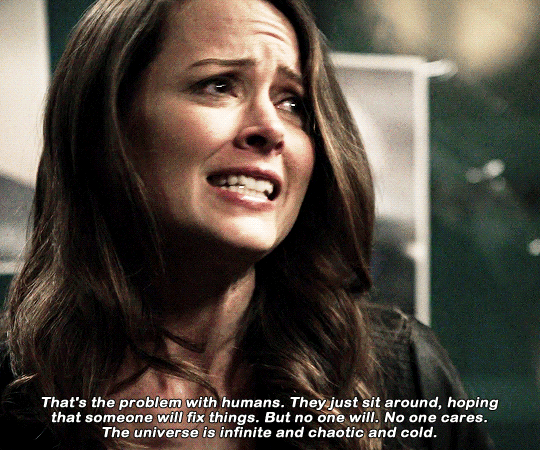

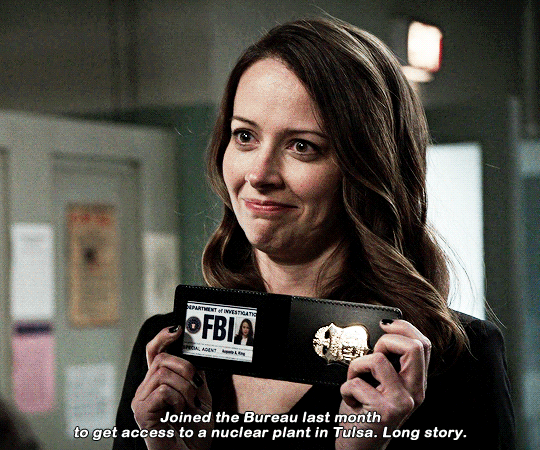

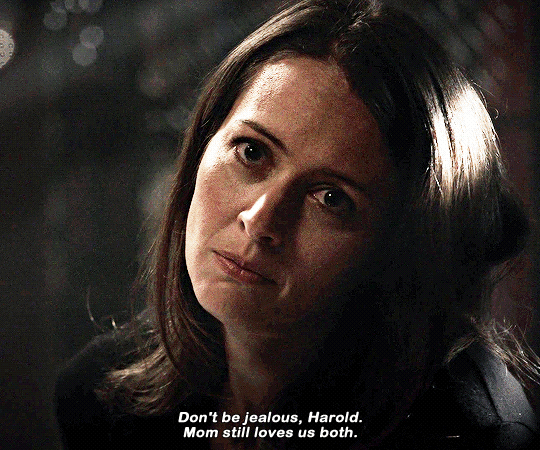
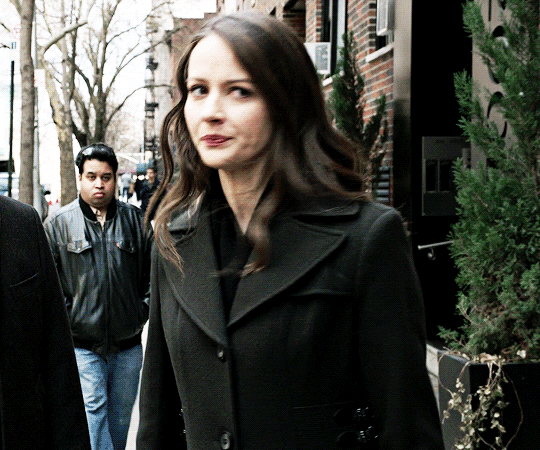
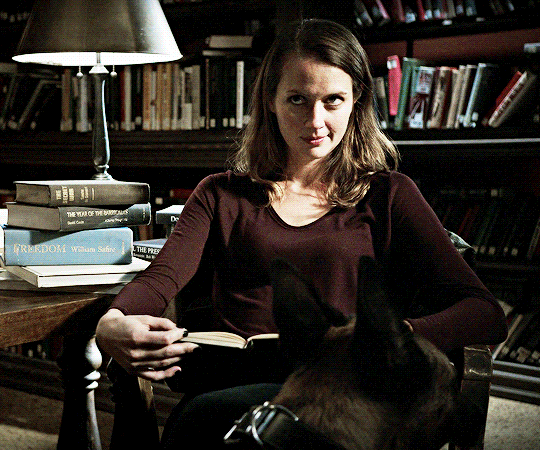
Amy Acker as Root
Person of Interest
Created by Jonathan Nolan
374 notes
·
View notes
Text
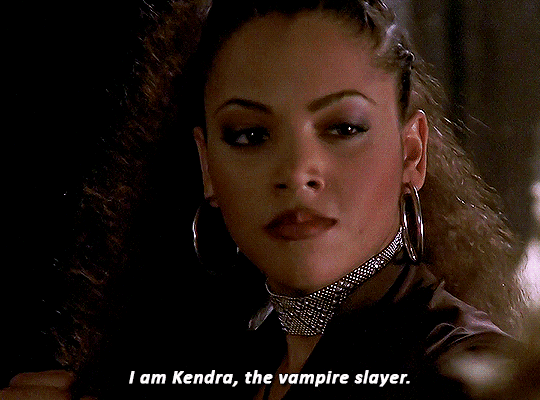
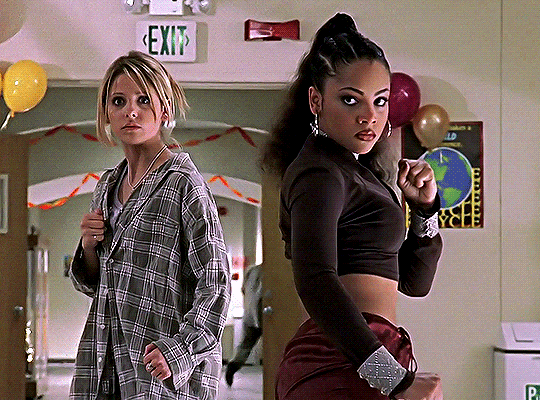




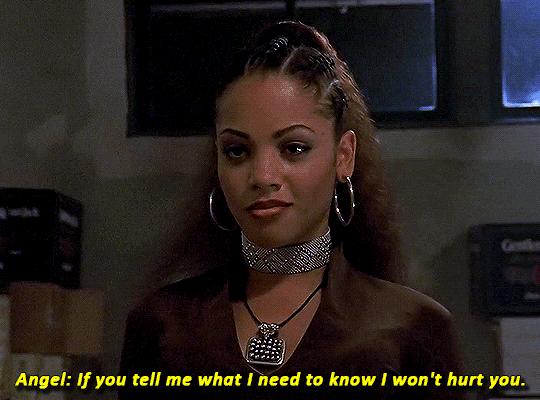



BIANCA LAWSON as KENDRA YOUNG
Buffy the Vampire Slayer - 2.09 | 2.10 | 2.21
301 notes
·
View notes
Text
"I did my PhD in mathematical physics. I was interested in, you know" -- she laughs -- "reality. But I couldn't stand the way physicists did math. Too many numbers involved. Half my classmates couldn't even construct the reals."
2 notes
·
View notes
Text
I will not comment on any more Buffy adjacent polling.
I will not comment on any more Buffy adjacent polling.
I will not comment on any more Buffy adjacent polling.
I will not comment on any more Buffy adjacent polling.
I will not comment on any more Buffy adjacent polling.
4 notes
·
View notes
Text
The Three Commandments
The thing about writing is this: you gotta start in medias res, to hook your readers with action immediately. But readers aren’t invested in people they know nothing about, so start with a framing scene that instead describes the characters and the stakes. But those scenes are boring, so cut straight to the action, after opening with a clever quip, but open in the style of the story, and try not to be too clever in the opener, it looks tacky. One shouldn’t use too many dialogue tags, it’s distracting; but you can use ‘said’ a lot, because ‘said’ is invisible, but don’t use ‘said’ too much because it’s boring and uninformative – make sure to vary your dialogue tags to be as descriptive as possible, except don’t do that because it’s distracting, and instead rely mostly on ‘said’ and only use others when you need them. But don’t use ‘said’ too often; you should avoid dialogue tags as much as you possibly can and indicate speakers through describing their reactions. But don’t do that, it’s distracting.
Having a viewpoint character describe themselves is amateurish, so avoid that. But also be sure to describe your viewpoint character so that the reader can picture them. And include a lot of introspection, so we can see their mindset, but don’t include too much introspection, because it’s boring and takes away from the action and really bogs down the story, but also remember to include plenty of introspection so your character doesn’t feel like a robot. And adverbs are great action descriptors; you should have a lot of them, but don’t use a lot of adverbs; they’re amateurish and bog down the story. And
The reason new writers are bombarded with so much outright contradictory writing advice is that these tips are conditional. It depends on your style, your genre, your audience, your level of skill, and what problems in your writing you’re trying to fix. Which is why, when I’m writing, I tend to focus on what I call my Three Commandments of Writing. These are the overall rules; before accepting any writing advice, I check whether it reinforces one of these rules or not. If not, I ditch it.
1: Thou Shalt Have Something To Say
What’s your book about?
I don’t mean, describe to me the plot. I mean, why should anybody read this? What’s its thesis? What’s its reason for existence, from the reader’s perspective? People write stories for all kinds of reasons, but things like ‘I just wanted to get it out of my head’ are meaningless from a reader perspective. The greatest piece of writing advice I ever received was you putting words on a page does not obligate anybody to read them. So why are the words there? What point are you trying to make?
The purpose of your story can vary wildly. Usually, you’ll be exploring some kind of thesis, especially if you write genre fiction. Curse Words, for example, is an exploration of self-perpetuating power structures and how aiming for short-term stability and safety can cause long-term problems, as well as the responsibilities of an agitator when seeking to do the necessary work of dismantling those power structures. Most of the things in Curse Words eventually fold back into exploring this question. Alternately, you might just have a really cool idea for a society or alien species or something and want to show it off (note: it can be VERY VERY HARD to carry a story on a ‘cool original concept’ by itself. You think your sky society where they fly above the clouds and have no rainfall and have to harvest water from the clouds below is a cool enough idea to carry a story: You’re almost certainly wrong. These cool concept stories work best when they are either very short, or working in conjunction with exploring a theme). You might be writing a mystery series where each story is a standalone mystery and the point is to present a puzzle and solve a fun mystery each book. Maybe you’re just here to make the reader laugh, and will throw in anything you can find that’ll act as framing for better jokes. In some genres, readers know exactly what they want and have gotten it a hundred times before and want that story again but with different character names – maybe you’re writing one of those. (These stories are popular in romance, pulp fantasy, some action genres, and rather a lot of types of fanfiction).
Whatever the main point of your story is, you should know it by the time you finish the first draft, because you simply cannot write the second draft if you don’t know what the point of the story is. (If you write web serials and are publishing the first draft, you’ll need to figure it out a lot faster.)
Once you know what the point of your story is, you can assess all writing decisions through this lens – does this help or hurt the point of my story?
2: Thou Shalt Respect Thy Reader’s Investment
Readers invest a lot in a story. Sometimes it’s money, if they bought your book, but even if your story is free, they invest time, attention, and emotional investment. The vast majority of your job is making that investment worth it. There are two factors to this – lowering the investment, and increasing the payoff. If you can lower your audience’s suspension of disbelief through consistent characterisation, realistic (for your genre – this may deviate from real realism) worldbuilding, and appropriately foreshadowing and forewarning any unexpected rules of your world. You can lower the amount of effort or attention your audience need to put into getting into your story by writing in a clear manner, using an entertaining tone, and relying on cultural touchpoints they understand already instead of pushing them in the deep end into a completely unfamiliar situation. The lower their initial investment, the easier it is to make the payoff worth it.
Two important notes here: one, not all audiences view investment in the same way. Your average reader views time as a major investment, but readers of long fiction (epic fantasies, web serials, et cetera) often view length as part of the payoff. Brandon Sanderson fans don’t grab his latest book and think “Uuuugh, why does it have to be so looong!” Similarly, some people like being thrown in the deep end and having to put a lot of work into figuring out what the fuck is going on with no onboarding. This is one of science fiction’s main tactics for forcibly immersing you in a future world. So the valuation of what counts as too much investment varies drastically between readers.
Two, it’s not always the best idea to minimise the necessary investment at all costs. Generally, engagement with art asks something of us, and that’s part of the appeal. Minimum-effort books do have their appeal and their place, in the same way that idle games or repetitive sitcoms have their appeal and their place, but the memorable stories, the ones that have staying power and provide real value, are the ones that ask something of the reader. If they’re not investing anything, they have no incentive to engage, and you’re just filling in time. This commandment does not exist to tell you to try to ask nothing of your audience – you should be asking something of your audience. It exists to tell you to respect that investment. Know what you’re asking of your audience, and make sure that the ask is less than the payoff.
The other way to respect the investment is of course to focus on a great payoff. Make those characters socially fascinating, make that sacrifice emotionally rending, make the answer to that mystery intellectually fulfilling. If you can make the investment worth it, they’ll enjoy your story. And if you consistently make their investment worth it, you build trust, and they’ll be willing to invest more next time, which means you can ask more of them and give them an even better payoff. Audience trust is a very precious currency and this is how you build it – be worth their time.
But how do you know what your audience does and doesn’t consider an onerous investment? And how do you know what kinds of payoff they’ll find rewarding? Easy – they self-sort. Part of your job is telling your audience what to expect from you as soon as you can, so that if it’s not for them, they’ll leave, and if it is, they’ll invest and appreciate the return. (“Oh but I want as many people reading my story as possible!” No, you don’t. If you want that, you can write paint-by-numbers common denominator mass appeal fic. What you want is the audience who will enjoy your story; everyone else is a waste of time, and is in fact, detrimental to your success, because if they don’t like your story then they’re likely to be bad marketing. You want these people to bounce off and leave before you disappoint them. Don’t try to trick them into staying around.) Your audience should know, very early on, what kind of an experience they’re in for, what the tone will be, the genre and character(s) they’re going to follow, that sort of thing. The first couple of chapters of Time to Orbit: Unknown, for example, are a micro-example of the sorts of mysteries that Aspen will be dealing with for most of the book, as well as a sample of their character voice, the way they approach problems, and enough of their background, world and behaviour for the reader to decide if this sort of story is for them. We also start the story with some mildly graphic medical stuff, enough physics for the reader to determine the ‘hardness’ of the scifi, and about the level of physical risk that Aspen will be putting themselves at for most of the book. This is all important information for a reader to have.
If you are mindful of the investment your readers are making, mindful of the value of the payoff, and honest with them about both from the start so that they can decide whether the story is for them, you can respect their investment and make sure they have a good time.
3: Thou Shalt Not Make Thy World Less Interesting
This one’s really about payoff, but it’s important enough to be its own commandment. It relates primarily to twists, reveals, worldbuilding, and killing off storylines or characters. One mistake that I see new writers make all the time is that they tank the engagement of their story by introducing a cool fun twist that seems so awesome in the moment and then… is a major letdown, because the implications make the world less interesting.
“It was all a dream” twists often fall into this trap. Contrary to popular opinion, I think these twists can be done extremely well. I’ve seen them done extremely well. The vast majority of the time, they’re very bad. They’re bad because they take an interesting world and make it boring. The same is true of poorly thought out, shocking character deaths – when you kill a character, you kill their potential, and if they’re a character worth killing in a high impact way then this is always a huge sacrifice on your part. Is it worth it? Will it make the story more interesting? Similarly, if your bad guy is going to get up and gloat ‘Aha, your quest was all planned by me, I was working in the shadows to get you to acquire the Mystery Object since I could not! You have fallen into my trap! Now give me the Mystery Object!’, is this a more interesting story than if the protagonist’s journey had actually been their own unmanipulated adventure? It makes your bad guy look clever and can be a cool twist, but does it mean that all those times your protagonist escaped the bad guy’s men by the skin of his teeth, he was being allowed to escape? Are they retroactively less interesting now?
Whether these twists work or not will depend on how you’ve constructed the rest of your story. Do they make your world more or less interesting?
If you have the audience’s trust, it’s permissible to make your world temporarily less interesting. You can kill off the cool guy with the awesome plan, or make it so that the Chosen One wasn’t actually the Chosen One, or even have the main character wake up and find out it was all a dream, and let the reader marinate in disappointment for a little while before you pick it up again and turn things around so that actually, that twist does lead to a more interesting story! But you have to pick it up again. Don’t leave them with the version that’s less interesting than the story you tanked for the twist. The general slop of interest must trend upward, and your sacrifices need to all lead into the more interesting world. Otherwise, your readers will be disappointed, and their experience will be tainted.
Whenever I’m looking at a new piece of writing advice, I view it through these three rules. Is this plot still delivering on the book’s purpose, or have I gone off the rails somewhere and just stared writing random stuff? Does making this character ‘more relateable’ help or hinder that goal? Does this argument with the protagonists’ mother tell the reader anything or lead to any useful payoff; is it respectful of their time? Will starting in medias res give the audience an accurate view of the story and help them decide whether to invest? Does this big twist that challenges all the assumptions we’ve made so far imply a world that is more or less interesting than the world previously implied?
Hopefully these can help you, too.
1K notes
·
View notes
Text
I wish Faith could've met Kendra.
So much of Faith's self-image and growing isolation and self-hatred in Season 3 (and beyond!) is tied up in the idea that, above all else, she isn't Buffy. The idea that she is in fact defined by being not-Buffy. That Buffy is the "good Slayer", that Buffy gets a family and friends and a Watcher; that Buffy plays by the rules; that Buffy doesn't ever get too emotional or let herself have too much fun. By the fear that – however much Faith tries to persuade Buffy of the opposite – they really aren’t alike in a way that matters. (“You’re not me”, as Faith will grimly tell Buffy after her coma).
But imagine if Faith had somehow had the chance to meet Kendra; imagine if Kendra had somehow survived into Season 3 even while Faith was Called.
Kendra is -- while far less defined as a character, barely appearing in three episodes before her untimely death -- also defined within the narrative by not being Buffy. She loves studying and reading ancient texts and has apparently memorized a Slayer Handbook which Buffy's Watcher gave up on even using for his Slayer; she knew about her potential destiny from a very young age and trained for it for years before being Called; while Buffy has to constantly hide her activities as the Slayer from her mother, Kednra was raised directly by her Watcher and doesn't even remember the parents who gave her up to be a Slayer.
Yes, Kendra and Faith have many things in common Buffy doesn't -- no real friends or life outside Slaying in particular -- and maybe they would (eventually) bond a little over those if they ever got to meet. But consider things from Kendra's perspective.
From Kendra’s point of view, Buffy is the wild and unpredictable Slayer. The loose cannon who doesn't follow orders or report back to her Watcher the way she's supposed to, the reckless girl who spends time in places she shouldn't with people that she shouldn't, who parties and has fun and tempts Kendra into doing the same. The Slayer who spends less time training and studying, but is convinced she'd beat Kendra in a fight anyway because she's more in touch with her emotions and is willing to use her anger to her advantage in a fight.
Imagine how cathartic it would be for Faith if she could meet her predecessor, another young girl who knows what it's like to be a Slayer and to have long given up on any chance of a normal life, only for that other Slayer's first reaction on meeting her to be an appalled recognition that "oh no, you're just like Buffy Summers".
58 notes
·
View notes
Text
Things that work in fiction but not real life
torture getting reliable information out of people
knocking someone out to harmlessly incapacitate them for like an hour
jumping into water from staggering heights and surviving the fall completely intact
calling the police to deescalate a situation
rafting your way off a desert island
correctly profiling total strangers based on vibes
effectively operating every computer by typing and nothing else
ripping an IV out of your arm without consequences
heterosexual cowboy
91K notes
·
View notes
Audio
18 notes
·
View notes
Text
ever since i was a little girl i knew i wanted to be a pretentious grad student
11 notes
·
View notes




